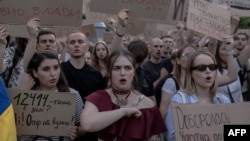Ukrainian President Volodymyr Zelenskyy has submitted a new draft bill to parliament to restore the independence of two anti-corruption agencies, after a controversial law curbing their autonomy sparked nationwide protests.
The National Anti-Corruption Bureau of Ukraine (NABU) and the Specialized Anti-Corruption Prosecutor's Office (SAPO) had effectively lost the guarantees that enabled them to combat high-level corruption when Zelenskyy signed the law on July 22.
Following two days of mass protests in Kyiv and a number of other major Ukrainian cities and criticism from Kyiv's European allies, Zelenskyy submittedthe new bill to parliament on July 24. The proposed legislation is set to restore all procedural powers and guarantees of independence, according to NABU.
"NABU and SAPO participated in the preparation of the text and call on the Verkhovna Rada of Ukraine to adopt the president's initiative as a basis and in general as soon as possible," the agency said in a statement published in Telegram.
"This will help prevent threats to criminal proceedings investigated by NABU and SAPO," it added.
Zelenskyy said on Telegram that the "balanced text" of the draft bill now guarantees the independence of both agencies and the "absence of Russian influence" on their work, which he had previously claimed was the main reason for the move that brought the agencies under the control of the Prosecutor-General.
"We respect the position of all Ukrainians," Zelenskyy added in his post.
Ruslan Stefanchuk, speaker of Ukraine’s parliament, announced on Facebook that the document would be reviewed during the next plenary session. Prior to the announcement, Ukrainian opposition deputy Yaroslav Zheleznyak reported that the Verkhovna Rada had gone on "vacation" until the end of August.
However, in his Facebook post, Stefanchuk added that the session would be held sooner than a month from now.
Later on July 24, Zelenskyy said he had informed German Chancellor Friedrich Merz of the new legislation efforts, adding that he proposed that Germany join a review of the draft bill.
"Friedrich assured me of his readiness to help," Zelenskyy added.
Zelenskyy also said the conversation dealt with the implementation of Ukraine's agreements with the EU on opening the first accession negotiations cluster.
"There is absolute support from Germany on this issue," he said.
A day earlier, the European Union called the decision to adopt the original bill a "serious step back," while other opponents of the law voiced concern that it represented a stark reversal after a decade of democratization following the pro-European and anti-corruption Maidan protests.
Germany said the legal change "hampered Ukraine's way towards the EU," while European Commission President Ursula von der Leyen expressed strong concerns about the potential consequences of amendments to Ukraine's anti-corruption architecture.
Despite massive air attacks on the capital in recent days, hundreds of Ukrainians protested in central Kyiv, demanding that Zelenskyy veto the bill, saying it had been rushed through and would allow the government to meddle in high-profile corruption cases.
“In essence, Ukraine is being dragged 10 years back in terms of the fight against corruption,” Dmytro Kozyatynskiy, a young veteran of the war against Russia’s invasion, said at one of the initial protests against the law in Kyiv.
NABU investigates corruption among state institutions, while SAPO prosecutes other corruption. Some of NABU's high-profile investigations since it began its work in 2015 have embarrassed senior officials.















